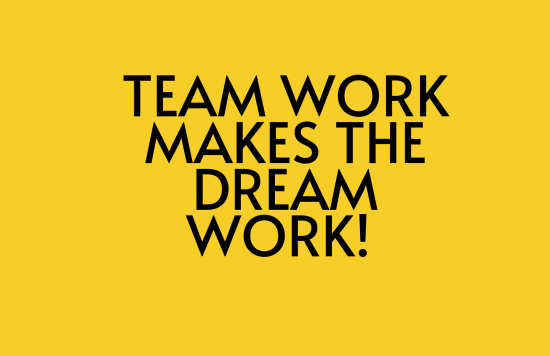I know, I know it’s a cheesy title(!) but I just couldn’t resist. It is just so apt when we are thinking about how we need to work together with our informal carers to get the best outcomes for people using our services.
As part of Carers Week I thought I would focus this blog on how necessary it is for us as health and social care professionals to treat carers as a valued member of our team. There is loads to unpack here ...
First of all, like any member of our team, we need to make sure they are in the room! So, whenever it’s appropriate, remember to Invite them along to be part of the conversation. We have to make involvement easy for carers and their working pattern and understanding. So ask yourself, how accessible is it for a carer to be part of your team.
We need to make sure we respect their opinions and treat them as experts in the care and support of the person they care for. Like all of us, they bring an important perspective.
We all need a break! I don’t know about you but I can’t work for hours and hours without a break. The quality of my work deteriorates and it really stresses me out! So let’s make sure we ask carers when they get a break, and if they don’t get one, help them make a plan to do so.
Are you provided with training to do your role?? Well remember, just like professionals, carers need to be provided with the skills and knowledge they need to provide a high level of care, and give the person they care for the best chance of recovery.
Small gestures can go a long way when it comes to supporting informal carers
Carers Week for me is a perfect time to reflect, acknowledge and celebrate the hard work, dedication and sacrifice of people across the country who provide informal support to a loved one.
My role here in ELFT is to make sure that we recognise those informal carers and provide them with the assessments and support plans that they need.
However, whilst this work is important, what carers tell me is that all staff here at ELFT can make a really positive impact on their wellbeing, by simply communicating with them in a super positive way.
So, no need to update RiO, EMIS Care First (our patient record systems), or write a long report to help carers. You just need to:
- Smile: be a warm and welcoming presence for people that contact ELFT
- Be in the moment: be with the person in that moment and give them your full attention
- Be an active listener: show the person that you are listening and hearing what they are saying
- Be empathetic: show empathy and understanding for their situation, put yourself into their shoes
- Recognise: recognise that they are an expert in the care and support of their loved one
What carers would like you to remember is that they themselves may well be suffering from trauma, mental ill health or be, quite simply, exhausted!
They might be lonely and isolated - remember we might be the only person they speak to that day and our words and behaviour really count.
They may feel a sense of guilt or loss. They may just feel like they don’t know what they are doing, feel they always saying the wrong thing or can’t get their head around what’s happening. So small gestures of kindness can go a long way!
Celebrate and acknowledge all of the great work going on
The good practice stuff I have talked about above, I see this happening all the time across the work we do here in City and Hackney, and across the Trust. So keep up the great work you are doing with carers, and if there are any opportunities to do more, then grab it with both hands!
I am lucky enough to sit on the ELFT's Family, Friend and Carers Strategy implementation group. This means that I have seen some of the amazing work going on to support carers right across the Trust.
Here in City and Hackney, for example, we have just started a QI project to develop a hospital and carers service based on the wards, bringing community and hospital resources together to support our informal carers.
Bedfordshire and Luton have an I-Care Charter that really puts the carer at the centre of their thinking. And Tower Hamlets are doing great things for carers of older adults with dementia and mental health problems.
